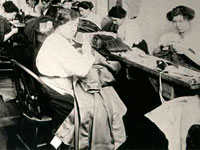Inventing America: Lowell and the Industrial Revolution
This workshop combines scholarly presentations with on-site investigations of the canals, mills, worker housing, and exhibits of Lowell National Historical Park and of other sites in Lowell's historic district. Sessions draw on scholarly monographs, primary sources (such as "mill girl" letters), and works of literature and historical fiction. The workshop intersperses hands-on activities with lecture-discussions and field investigations. In addition to Lowell's landmark resources, the workshop takes full advantage of Old Sturbridge Village exhibits and scholars to explore pre-industrial rural life and draw on the expertise of scholars and presenters at Walden Pond and Minute Man National Historical Park in Concord, Massachusetts, to explore how prominent authors addressed the question of industrialization's effect on American life, values, and the environment.

